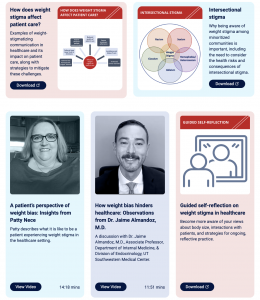People with high weight often face judgment and unfair treatment in their daily lives – a pervasive societal problem known as weight stigma. This problem extends to the health care setting, where patients’ stigmatizing experiences can lead to mistrust of healthcare professionals and even health care avoidance.
On Tuesday, in collaboration with Eli Lilly and Company, the UConn Rudd Center for Food Policy and Health launched a new educational website focused on weight stigma in health care settings titled, “Supportive Obesity Care.” The website, which is intended for use by healthcare professionals, seeks to raise awareness of weight stigma in the health care setting, provide insights on the damaging effects of weight stigma on patients, and offer strategies for reducing weight bias and delivering supportive care to patients with high body weight.

“Our research shows that when people feel stigmatized about their weight by their health care provider, this can compromise their health, reduce the quality of their care, and lead them to avoid healthcare in the future,” says Rebecca Puhl, deputy director of the UConn Rudd Center and a professor in the Department of Human Development and Family Sciences. “More compassionate and supportive communication by health care professionals is essential to ensure that patients of all body sizes receive the support and clinical care they deserve.”
The new website responds to increasing calls for education about weight stigma in the medical community and strategies to improve health care experiences for patients with larger body sizes. “At the Rudd Center, we receive numerous requests from medical professionals and health organizations for resources and training on these issues,” says Puhl. “Our aim is to provide these resources in an accessible and useful way for health care professionals to implement in their clinical practice and for education and training of students in professional health disciplines.”
The website offers a collection of free educational, evidence-based videos, podcasts, and handouts. Users can expect to find a variety of tools to help them improve healthcare delivery including resources on how to engage in more supportive communication with patients about weight-related health, create an inclusive and welcoming clinical care environment, and explain obesity pathophysiology to patients. In addition to videos led by Dr. Puhl, the site also features resources from patient and clinician perspectives to help demonstrate how healthcare providers can put these tools into practice.
“It is our goal to equip health care professionals with the tools they need to provide patients of all body sizes with more respectful and supportive care,” says Puhl.
To learn more about this resource, please visit the Supportive Obesity Care website.



